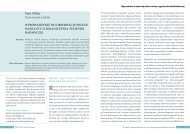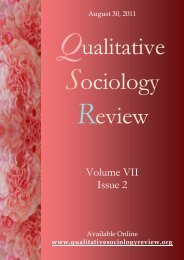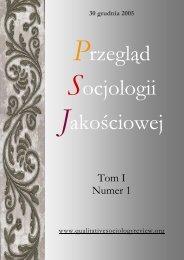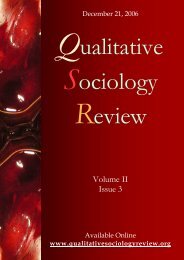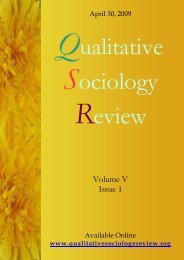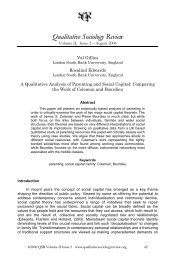Pobierz wydanie - Qualitative Sociology Review
Pobierz wydanie - Qualitative Sociology Review
Pobierz wydanie - Qualitative Sociology Review
Create successful ePaper yourself
Turn your PDF publications into a flip-book with our unique Google optimized e-Paper software.
Author-Supplied Abstracts and Keywords<br />
Wiktor Marzec<br />
University of Łódź, Poland<br />
Frontiers of the social worlds’ theory<br />
This essay opens to scrutiny the Anselm Strauss's social worlds theoretical<br />
perspective applicability borders problem. Applying a specific conceptual experiment<br />
that consists of an attempt to explore the “extreme” phenomenon of the consensual<br />
SM communities by reconstructing the foregoing phenomenon in frame of the social<br />
worlds’ theory, this argument is about to elucidate these elements of the theory, that<br />
despite of being hard to apprehend, comprise the crucial aspects of the analyzed<br />
phenomenon. A unique way of organizing the subjectively lived experience and<br />
shared definition of the situation (in this case the interpretations of sexual violence<br />
practice) could not be conceptualized on the base of the participant’s subjective selfconsciousness.<br />
The symbolic interactionist tradition is indirectly based on the idea of<br />
Cartesian, self-conscious individual that mainly express its experiences on a verbal<br />
interactional level. Therefore, tracing how the notion of the person acting evolves in<br />
the interactionist and pragmatic tradition (in which Strauss's theory is rooted in),<br />
facilitates recognition of this concept’s potential limits. In fact, strict revisions in the<br />
area of subjectivity idea applied in any human and social sciences, that should not be<br />
overestimated in the foregoing context, allow a more theoretically conscious look on<br />
the social worlds’ theory.<br />
Keywords:<br />
Social worlds; Anselm Strauss; Symbolic Interactionism; Rational person acting;<br />
Body, Sadomasochism, BDSM, Experience.<br />
Katarzyna Niziołek<br />
University of Bialystok, Poland<br />
Participatory photography. From qualitative research of social worlds to<br />
sociological intervention<br />
In the article, resorting to the phenomenological understanding of the “social world”,<br />
the authoress looks for the new possibilities of researching social worlds with the use<br />
of participatory photography, and by integrating research and citizen practice. One<br />
may speak of participatory photography when individuals or groups that would<br />
traditionally constitute the objects of observation take and interpret photographs<br />
representing significant parts of their lives and experiences themselves. Hence, as a<br />
research technique, participatory photography changes the perspective of cognition<br />
from the position of an outsider to the one of an insider. In this way, it allows insight,<br />
in accordance with the directives of interpretative sociology, into the subjective<br />
definitions of the observed situations, as constructed by the participants. Then, it<br />
©2011 PSJ Tom VII Numer 1 Przegląd Socjologii Jakościowej 99<br />
www.qualitativesociologyreview.org



